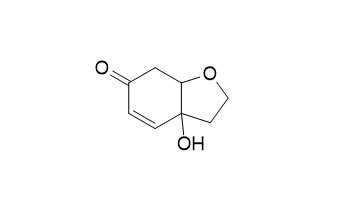Halleridone
halleridone activated Nrf2-mediated HO-1 expression and inhibited Aβ1-42-overexpressed microglial BV-2 cell activation
Inquire / Order:
manager@chemfaces.com
Technical Inquiries:
service@chemfaces.com
Tel:
+86-27-84237783
Fax:
+86-27-84254680
Address:
1 Building, No. 83, CheCheng Rd., Wuhan Economic and Technological Development Zone, Wuhan, Hubei 430056, PRC
Providing storage is as stated on the product vial and the vial is kept tightly sealed, the product can be stored for up to
24 months(2-8C).
Wherever possible, you should prepare and use solutions on the same day. However, if you need to make up stock solutions in advance, we recommend that you store the solution as aliquots in tightly sealed vials at -20C. Generally, these will be useable for up to two weeks. Before use, and prior to opening the vial we recommend that you allow your product to equilibrate to room temperature for at least 1 hour.
Need more advice on solubility, usage and handling? Please email to: service@chemfaces.com
The packaging of the product may have turned upside down during transportation, resulting in the natural compounds adhering to the neck or cap of the vial. take the vial out of its packaging and gently shake to let the compounds fall to the bottom of the vial. for liquid products, centrifuge at 200-500 RPM to gather the liquid at the bottom of the vial. try to avoid loss or contamination during handling.
Int J Mol Sci.2023, 24(22):16465.
Biomed Chromatogr.2022, 36(11):e5462.
Planta Med.2023, 2192-2281
Nutr Res Pract.2020, 14(5):478-489.
Appl. Sci. 2021, 11(8),3437.
Food Quality and Safety2018, 2:213-219
Int J Mol Sci.2022, 23(5):2796.
Neurochem Int.2018, 121:114-124
Korean Journal of Plant Resources2021, 34(1):52-58.
J Appl Microbiol.2022, 132(2):949-963.
Related and Featured Products
J Med Food . 2017 Nov;20(11):1091-1099.
Nrf2-Mediated HO-1 Induction and Antineuroinflammatory Activities of Halleridone[Pubmed:
28910180]
Nuclear factor E2-related factor 2 (Nrf2) is the master regulator of antioxidant enzymes and is known to act on the nuclear factor kappa-light-chain-enhancer of activated B cell (NF-κB) signaling pathway. Few studies have examined the bioactivity of Halleridone. Herein, we investigated whether Halleridone, which was isolated from the stems of the plant Cornus walteri, could regulate Nrf2-mediated heme oxygenase (HO)-1 expression and prevent intramicroglial inflammation induced by amyloid beta (Aβ)1-42 overexpression. Biochemical and molecular experiments, such as real-time polymerase chain reaction, Western blot analysis, immunocytochemistry, immunofluorescence, and luciferase reporter gene assays, were performed. The results demonstrated that Halleridone promoted the upregulation of Nrf2 expression and its translocation to the nucleus, thereby activating antioxidant response element gene transcription and HO-1 expression in murine hippocampal HT22 cells. Additionally, Halleridone removed intramicroglial Aβ1-42 and suppressed the production of inflammatory mediators such as interleukin (IL)-1β, IL-6, prostaglandin E2, and nitric oxide (NO) induced by artificially overexpressed Aβ1-42 and decreased pNF-κB accumulation in the nucleus and the expression of inducible NO synthase and cyclooxygenase II in BV-2 cells. In conclusion, Halleridone activated Nrf2-mediated HO-1 expression and inhibited Aβ1-42-overexpressed microglial BV-2 cell activation. These observations suggest that Halleridone may have therapeutic potential for targeting neurodegeneration through neuroinflammation.
Chem Biodivers . 2015 Jan;12(1):148-152.
Two new hydronaphthoquinones from Sinningia aggregata (Gesneriaceae) and cytotoxic activity of aggregatin D[Pubmed:
25641842]
Two new hydronaphthoquinones, aggregatins E and F (1 and 2, resp.) were isolated from the tubers of Sinningia aggregata (Ker-Gawl.) Wiehler (Gesneriaceae), along with twelve known compounds aggregatin D (3), tectoquinone (4), 1-hydroxy-2-methylanthraquinone (5), icosyl ferulate (6), pustuline (7), 1,6-dihydroxy-2-methylanthranquinone (8), 6-hydroxy-2-methylanthraquinone (9), 7-hydroxy-2-methylanthraquinone (10), tyrosol (11), Halleridone (12), calceolarioside B (13), and cornoside (14). All compounds were identified by analysis of spectroscopic and spectrometric data. Compounds 3, 4, and 10 had already been reported in this species. Compounds 2 and 3 were evaluated against several tumor cell lines, but only 3 exhibited activities against UACC-62, 786-0 and OVCAR-3 cell lines, with IC50 values of 12.3, 12.8 and 0.3 μg/ml, respectively, without toxic effects on non-cancer cell line HaCat (human keratinocyte).
J Nat Prod . 2016 Apr 22;79(4):792-798.
Naphthochromenes and Related Constituents from the Tubers of Sinningia allagophylla[Pubmed:
27043314]
Chemical investigation of the tubers of Sinningia allagophylla led to the isolation of two new chromenes, (2S)-12-hydroxylapachenole (1) and (3R)-3,4-dihydro-3-hydroxy-4-oxo-8-methoxylapachenole (2), and three new dimeric chromenes, allagophylldimers A-C (3-5). Thirteen known compounds, 6-methoxy-7,8-benzocoumarin (6), lapachenole, 8-methoxylapachenole, tectoquinone, 7-hydroxytectoquinone, dunniol, α-dunnione, dunnione, 8-hydroxydunnione, aggregatin E, cedrol, oleanolic acid, and Halleridone, were also identified. 6-Methoxy-7,8-benzocoumarin (6) has been isolated for the first time from a natural source.



